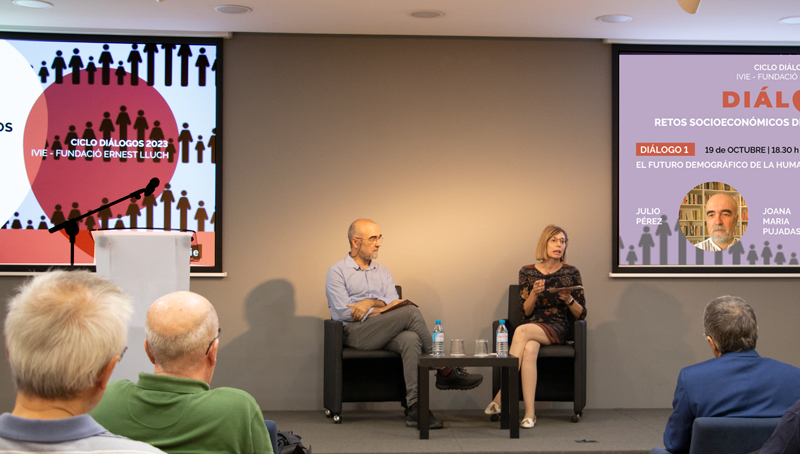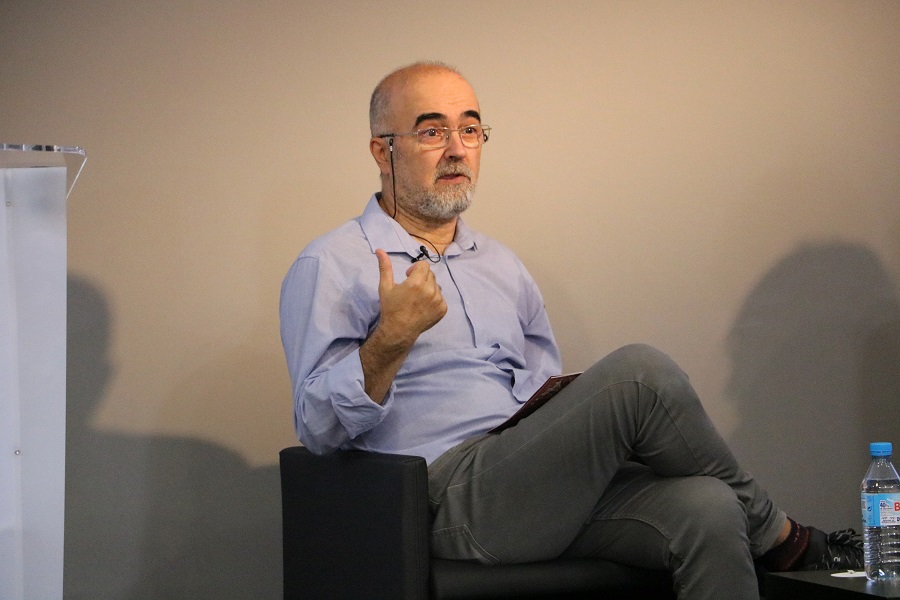Esta web utiliza cookies para que podamos ofrecerte la mejor experiencia de usuario posible. La información de las cookies se almacena en tu navegador y realiza funciones tales como reconocerte cuando vuelves a nuestra web o ayudar a nuestro equipo a comprender qué secciones de la web encuentras más interesantes y útiles.
News

Julio Pérez and Joana Maria Pujadas reject the idea that a demographic crisis exists, instead they agree that "aging should not be seen as a burden for society, but as an opportunity"
The two demographers confirm that world population growth will soon peak and then begin a global decrease, which Europe is already experiencing
The Ernest Lluch Foundation and the Ivie organized a series of dialogues titled “Socioeconomic challenges of demographic change.” The first dialogue entitled The Demographic Future of Humanity featured Julio Pérez, Head of the Department of Population at the Institute of Economy, Geography y Demography (IEGD), and Joana Maria Pujadas, Researcher and co-head of the Historical Demography area at the Center for Demographic Studies of the Autonomous University of Barcelona, and Associate Professor at the Department of Economic History of the University of Barcelona. Both experts agreed that the alarming narrative about Spain’s low birth rate and population loss is unfounded.
“From a demographic point of view, we (Spain) have done well; our life expectancy has gone from 40 years to over 80,” emphasized Joana Maria Pujadas. She insisted that there is no demographic crisis, but instead, the generational structure model needs to be rethought, because people over 65 represent a valuable human capital.
Julio Pérez shared the same view, according to whom we are witnessing a historical novelty: ” In Spain, survival is becoming more democratic. Until recently, no generation had been able to maintain alive half of those who were born past the age of fifteen. The study of the generations shows that not only have we managed to prevent people from dying prematurely, but they also enjoy improved living conditions and age differently”. The IEGD demographer stressed that aging does not have to be seen negatively. “Old people are not a plague, but an opportunity. Nobody talks about the fundamental work of pensioners in the economy.”
In the field of demography, a population is deemed to be aging when 10% of its members are over the age of 65. However, in Spain we have been within these parameters for more than a hundred years, according to the two speakers, and the nation has been adjusting to this generational shift.
The demographic shift that is already well underway in Europe and Spain will also extend globally to other countries. “The world population will likely decline in the future. A few decades ago there was talk of a demographic boom, but data has revealed that growth has slowed down. Right now, the primary topic of conversation is when will the peak be reached, whether it will be at 9 or 10 billion people.” At a local level, many regions are already experiencing a decrease in population.
As Julio Pérez clarified, immigration is the sole reason Spain is still growing. “The Spanish migratory balance remained negative until 1999, when immigration began to contribute to a positive balance and in 2007 the country reached a positive balance of over 700,000 people. None of the countries with a traditionally high volume of immigration have ever exceeded those figures.” According to the IEGD researcher, mobility among individuals is common, “people move in search of opportunities, even within Spain; the rural population leaves to seek the prosperity of the cities.” The two experts emphasized that public policies should focus on redistributing opportunities, because demographic policies are ineffective. Moreover, in their opinion, the policies that have been implemented in an effort to change demography have been highly ideological. “Historically, several regimes saw demography as a tool, because they had a utilitarian view of population. They believed that they had the right to control demographics, which is impossible. The people, not the policies, are responsible for the shift in demographics”.
For the two speakers, demographic change is being misinterpreted in a negative way, when in reality, “there is no greater expression of progress than ensuring that newly born children do not die within two weeks”. In their opinion, the challenge should be on how to redistribute opportunities so that everyone can pursue their dreams of well-being, rather than on how to alter demography.







